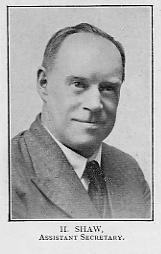 Herbert Shaw
Herbert ShawNAWU & MH&IWU Assistant General Secretary
We record the death of Herbert Shaw, on 14th April 1946, at the age of 69 years, British mental nurses have lost a lovable friend and colleague while this union mourns a pioneer whose lifetime was devoted to the interests of its members. Our sympathy goes to his widow and family; not least to his 94-year-old mother who braved a 100 miles journey to see her son before death brought relief from a painful illness. Herbert Shaw was assistant general secretary for 34 years until he retired in 1946.
Throughout George Gibson's general secretaryship, when Gibson was making a name in national affairs, Herbert Shaw was an able and modest collaborator in a unique trade union partnership. Both had outstanding but complementary qualifies that were vital to the union's development to its present strength and prestige. Joining Gibson as a victimised branch secretary from Wakefield Asylum (he was dismissed for using the hospital postal system to circulate union propaganda) he brought qualities of administration and sound judgment no less valuable than Gibson's robust orator;'' and vigorous personality.
He had learned much from the union's first general secretary, the Rev. H. M. S.Bankart, a Lancaster hospital chaplain who had also been sacked for his National Asylum Workers Union (NAWU) sympathies. He played a vital role in the 1918 Lancashire Asylum strikes for better pay and conditions at Rainhill, Whittingham, Lancaster and Prestwich Asylums which broke out on 5th September 1918 and the Bodmin stike over the wearing of the union badge which started on 22nd October 1918. later he encouraaged the staff at Radcliffe Asylum to make a stand agaginst pay cuts and longer hours.
For 33 years he was honorary editor of the NAWU & MH&IWU union Journal whose files bear eloquent "testimony to the pride and pains he took in this work—much of which could only be done in leisured moments at home.
Throughout the war and immediate post-war years he laboured under increasing pressure owing to the general secretary's absence on engagements of national importance and during the negotiations for amalgamation with the Health and Welfare Services Union it became apparent that a long and fruitful partnership was doomed to dissolution. Nor was he prepared to take on a fresh partner with the result that as soon as the Confederation became a fait accompli he retired on superannuation. His resignation implied no disapproval of the merger or its objects to bring All hospital workers into one organisation for in his farewell message printed in the Journal he said : "There is no reason why it should not become the unchallengeable representative body for the Health Services as a whole."
He was a welcome visitor to head office from time to time but his last conference appearance was at Weston-super-Mare in 1947 when he acted as a teller. It is not as a teller of votes that we shall remember him but as a teller of rich anecdotes of trade union struggle and an amateur editor whoma professional was proud to follow.
Representatives of the union who attended the funeral at Manchester included ; Mr. Joe Richards (assistant general secretary), Mr.F. J. Lynch (COHSE national officer), Mr. R.Farthing (COHSE financial officer), Mr. J. Yearsley (auditor), Mr. W. R. T. Booth (solicitor), Mr. F. and Mr. C. Swift (printers), Mr. C.Brooks (editor), Mr. P. H. Robertson (chairman No. 3 Regional Council), Mr. F.Rhodes (secretary Lancashire COHSE Federation of Officers & sub Officers Branches) and Mr. J. Simmons (COHSE Prestwich branch). Others present included Mr. J. H. Bleasdale, president, Mr. W. E. Wall, secretary, and members of Levenshume Private Club. the week.
Herbert was an ever-present, never absent, never late—everything in order ; nothing left to chance. The foundation upon which our organisation was built owes much to him, and of him we can truly say: Thou good and faithful Servant and Friend.

